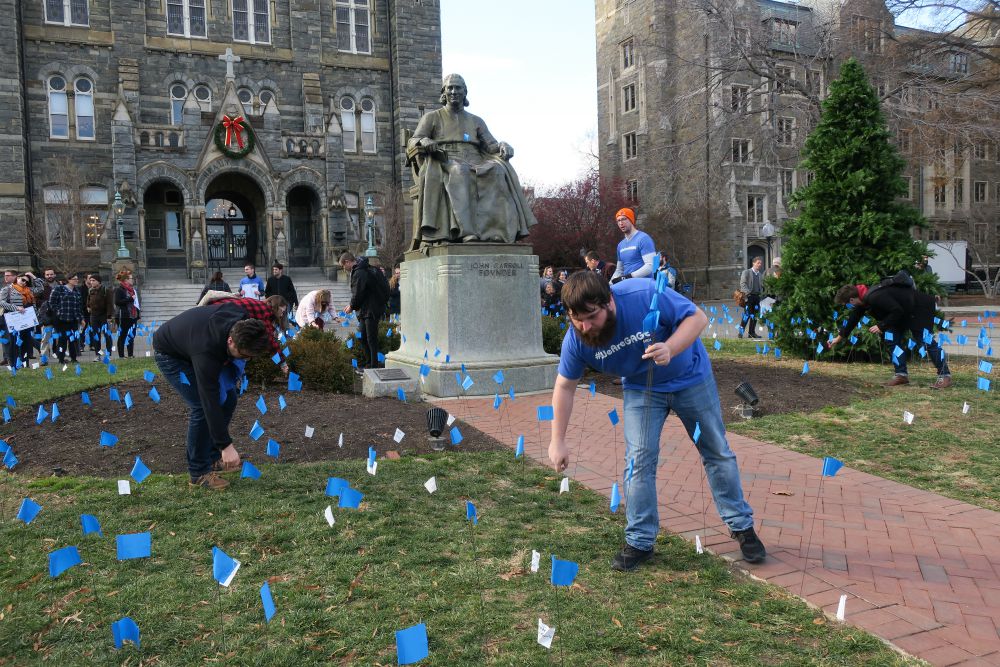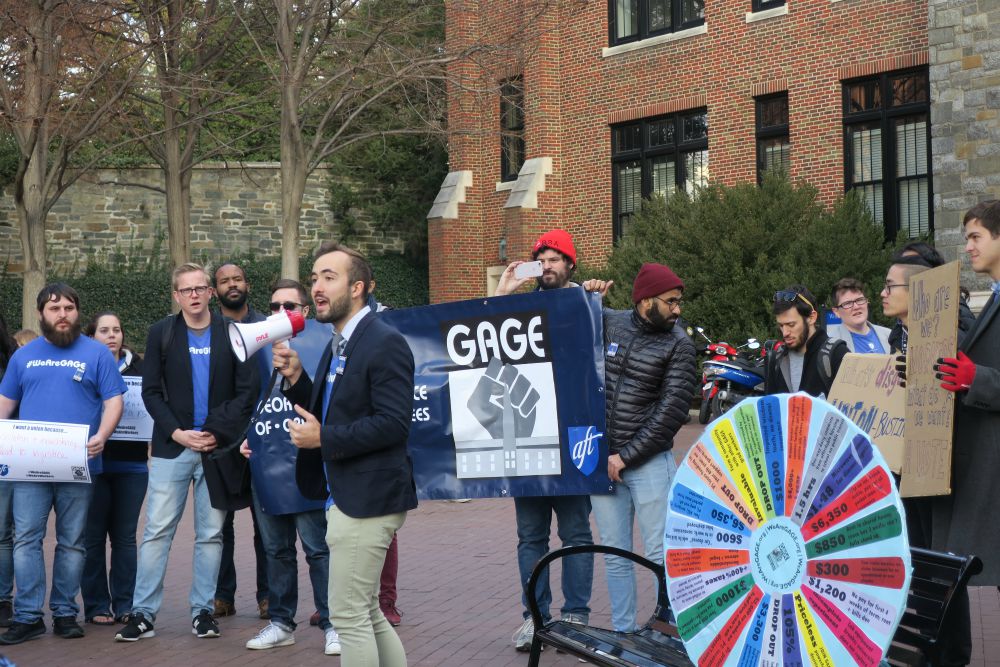
Georgetown Alliance of Graduate Employees members and supporters planted 800 blue flags Dec. 7 near the statue of the university's founder, John Carroll, to represent the 800 graduate students working at the school as research assistants, editors, teaching assistants, instructors of record and other positions. (NCR photo/Menachem Wecker)
Early afternoon on Dec. 7, Georgetown University's Red Square, a designated free-speech zone named for its brick pavement, was abuzz. A student huddled for warmth behind a table promoting the campus literary magazine Anthem. Nearby, other students handed out oranges for passersby to throw at a photo of Jim Boeheim, coach of the Syracuse men's basketball team, slated to play Georgetown nine days later.
Half an hour later, about 75 students, professors and staff gathered to protest the university's recent decision not to recognize collective bargaining efforts by a group of graduate students, who identify as "graduate workers." These students, who design, teach and grade their own classes and are overwhelmingly doctoral candidates, insist that they are employees, while the university maintains that their roles are essentially educational. A common rally refrain was, "We are workers!"
The Ph.D. students aren't in stocks being pelted with fruit, as the Syracuse coach was in effigy tied to a tree trunk, but they feel disrespected by an institution that has baffled them with its recent decision given its prior reputation for labor leadership.
"It was disheartening to hear that our work isn't valued by this university," said Deidre Nelms, a third-year doctoral student in philosophy and an organizer of the Georgetown Alliance of Graduate Employees (GAGE).
Georgetown ought to differentiate between master's students, who pay two years of tuition and then graduate, and doctoral students, who can spend five to eight years on campus, Nelms said. "We care about this institution and want to see change while we are here."
Georgetown joins other private universities, including Loyola University Chicago and University of Chicago, who have argued that graduate students shouldn't be considered employees. These efforts to curb or delay unionization votes come as new federal legislation is poised to tax graduate students on their tuition stipends, suggesting they are employees. It also comes about a year after the National Labor Relations ruled August 2016 that research and teaching assistants have the right to unionize.
The alliance of Georgetown graduate students had spent the prior week lobbying on the Hill and talking to as many senators as it could about the tax law. "Then the following week, we didn't get a neutrality agreement from a university that always gives workers a neutrality agreement," Nelms said. "We feel really disposable right now. We feel unvalued."
Loyola indicated last February that it would recognize a graduate student union, but it reversed that decision in late October. That timing struck Ruby Oram, a fifth-year U.S. history doctoral candidate and an active member of the Loyola Worker Coalition, and her colleagues as suspicious. The prior month, the Senate had approved President Donald Trump's NLRB pick.
"We feel the university is taking advantage of a more conservative political climate that is pro-business and anti-unionization," she said.
In the face of student pressure, Loyola has allocated more funds for graduate student travel and has increased stipends, but the changes are incremental. Oram's stipend, for example, went up from $18,000 to $20,000 annually, and the $50,000 set for travel is for hundreds of students across the entire graduate school.
"We took it as them throwing us some crumbs, so we'd keep quiet," Oram said.
Back at Georgetown, several safety officers and the dean of students trailed the protesters on Dec. 7, as they listened to megaphone-amplified speeches, including one from American Federation of Teachers president Randi Weingarten. They also observed the group as it walked to a statue of Georgetown founder, John Carroll, to plant 800 small, blue flags, symbolic of the university's 800 graduate workers, and as it went to the provost's office to deliver its message.
History professor Joseph McCartin, who directs Georgetown University's Kalmanovitz Initiative for Labor and the Working Poor, came to the rally having just penned a nearly-unanimous department resolution. The department "objects in the strongest terms to the university's present position and urges university administrators to reverse this position," it reads.
McCartin was among the members of Georgetown's Advisory Committee on Business Practices, which is tasked with advising the university on its Just Employment Policy. All of the members present at a recent meeting, including McCartin, resigned from the committee. Georgetown Provost Robert Groves had sidestepped the committee in the recent decision to block graduate unionization, McCartin said.
Sitting at his desk, which contained a "Hoyas for immigrant rights" cup and a sign on a lamp referring to the patron saint of precarious workers, McCartin turned his laptop around to face this reporter. He played a video from just over two years ago, in which Groves talked about Georgetown's then 10-year-old Just Employment Policy.
"I've been a member of a lot of institutions in my life," Groves said in the video, "and most institutions have policies and principles, but you never really know what they mean until there's a moment of strife and challenge." As Groves said "strife," McCartin cut in. "So ironic," he said.

Cory Young, a doctoral student in the history department at Georgetown University, speaks using a megaphone Dec. 7 on campus in Red Square. (NCR photo/Menachem Wecker)
Closing the video, McCartin said it's "almost eerie" watching Groves support adjunct professors in 2015 in ways that clearly apply to graduate students today.
"I'm confused," he said. "It seems like two people speaking. I have no idea how he could arrive at the position he arrived at this week, given how he was thinking and articulating his past position."
On social media, the university's position was also confusing people. Two days before the protest, a graduate student tweeted what he said was a screenshot of Georgetown's payment portal. Georgetown listed "PhD Graduate Teaching Assistant" for his position.
"Even the university's own accounting system classifies them as employees," McCartin said.
A Georgetown spokesperson downplayed the significance, however. "Students who receive any stipends have profiles in the Georgetown Management System and 'business title' is a default/required field in the tool," the spokesperson said.
At the protest, Kathryn Sanchez, a third-year biology Ph.D. candidate, was also shocked by the decision, particularly given Georgetown's values.
"This is a Jesuit institution. Living to Jesuit values — you would think that they would value the contributions of graduate workers," she said.
Advertisement
But McCartin, who has taught at Georgetown since 1999, is optimistic.
"My experience with this university is that when they come to fully realize the implications of a social justice issue, they end up on the right side of it," he said. "I have great hope that this will be reversed once they have begun to realize the implications of what they've done and said, which I don't think they fully understood."
But Georgetown gave no indication that it was rethinking its decision or regretted any part of its announcement and its aftermath. "Opportunities for students to conduct independent research and teach — under the mentorship of faculty members — are vital and often-required elements of the graduate-program curriculum," a spokesperson said. "The relationship a faculty member has with these students is one of faculty and student, mentor and mentee. This relationship is not, fundamentally, one of employer and employee."
As McCartin spoke about Georgetown, the U.S. labor historian couldn't resist a history lesson. Catholic colleges grew exponentially in both size and reputation in the post-World War II era, at a time of growing income and upward mobility, and they incubated and transmitted Catholic social teaching. In 1945, 92,000 students studied at Catholic colleges and universities. In the next three years, the GI Bill helped nearly double that number, and by 1970, Catholic schools educated 430,000 students a year, according to McCartin, who added that many, like Fordham University, had labor schools. "They taught people about how to form a union," McCartin said. But the economy and larger culture has changed.
"The centrality of Catholic social teaching, especially on issues of labor and inequality, to how these institutions run themselves has become less and less central," he said. Georgetown's Just Employment Policy impressively sought to have a larger view, and it positioned the university as a leader. "That's what makes this so tragic," he said.
[Menachem Wecker is co-author of the book Consider No Evil: Two Faith Traditions and the Problem of Academic Freedom in Religious Higher Education.]





